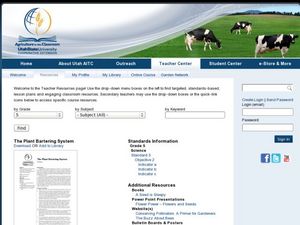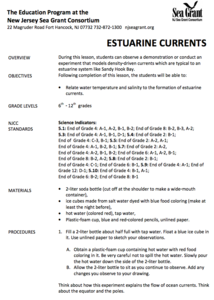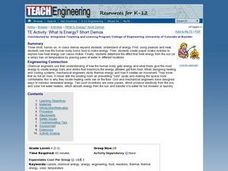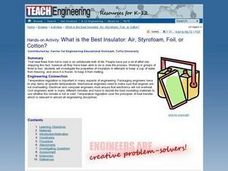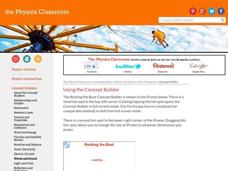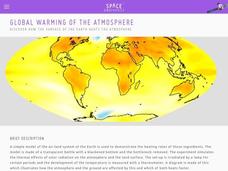Curated OER
Potential Consequences of Climate Variability and Change
Students examine the potential impact of climate change to agriculture, coastal areas, forests, water, and human health. They hypothesize what might happen to a sugar maple forest and hold a debate about global warming.
Curated OER
Global Water Cycle & Heat Flow
Students experiment to discover how different variables affect the water cycle. They do hat flow experiments and construct a computer heat flow model.
Curated OER
The Plant Bartering System
Fifth graders explore plant characteristics by viewing a flower and seed presentation. In this environmental adaptation lesson, 5th graders identify specific traits plants have in order to allow them to grow in different climates whether...
Curated OER
The Romans: Public Health and Water
In this Ancient Rome worksheet, students read about the public health system of Ancient Rome: aqueducts, public baths and sewers.
Curated OER
What Makes you Hot?
Students manipulate different variables in a model and make inferences about the temperature on Earth. In this heat lesson students calculate the blackbody radiation of an object at a certain temperature.
Curated OER
I Can Solve Capacity Problems (3 Worksheets)
For this math worksheet, learners read and solve 20 word problems in which they calculate capacity using basic addition or subtraction with regrouping. Note: All problems are in metric measurement only.
Curated OER
Cypress/Tupelo Swamps
Students study the geologic history of terrain, soils, and drainage patterns. They recognize ecological processes that determine the dynamic nature of habitats. They investigate the influence of human activity on the landscape.
Curated OER
Estuarine Currents
Students experiment observing a demonstration on models of density-driven currents which are typically found in an estuarine system of water flow. They compare/contrast water temperature and salinity to the formations of estuarine currents.
Curated OER
What Is Energy? Short Demos
Students engage in three short, hands-on, in-class demos which expand students' understand of energy. First, using peanuts and heat, students see how the human body burns food to make energy. Then, they create paper snake mobiles to...
Curated OER
Estuarine Currents
Students explore an estuarine system to gather data on density driven currents. This type of current is contrasted with temperature and wind driven currents.
Calvin Crest Outdoor School
Survival
Equip young campers with important survival knowledge with a set of engaging lessons. Teammates work together to complete three outdoor activities, which include building a shelter, starting a campfire, and finding directions in the...
Polar Trec
Sea Ice Impact
The arctic seas contain currents that are both warm (with high salinity) and cold (relatively fresh water) that circulate throughout the year. Through discussion, a lab, and a web quest, participants explore the impacts of melting and...
Curated OER
Fresh Water From the Oceans?
Learners participate in an activity in which they demonstrate how the evaporations of water from the oceans results in fresh water in the form of rain. They create a saltwater solution in a flask and boil the water until most of the...
Curated OER
A Cosmic Cafeteria
Young scholars indentify and differentiate between transit and surface food systems. Students measure energy that is released by various foods. Young scholars compare and contrast cooking with solar energy on earth and what they might...
Curated OER
Volume of Gas
Eighth graders investigate the effect of temperature on the volume of a gas in a closed container. They measure the height of the water in their beaker/container, conduct their experiment, and create a graph to illustrate their data.
Curated OER
What is the Best Insulator: Air, Styrofoam, Foil, or Cotton?
Students investigate the properties of insulators by attempting to keep a cup of water from freezing, and once it is frozen, to keep it from melting. They conduct the experiment, record and analyze the results, and answer discussion...
Curated OER
LEAF (Learning Exercises and Activities in the Forest
Young scholars observe populations and determine the functions (e.g., decomposers, producers, consumers) they serve in an ecosystem. They investigate the energy flow ecosystems. Students investigate factors (.g., Resources, light, water)...
Physics Classroom
Rocking the Boat
Sometimes it's okay to rock the boat! Science scholars manipulate wave properties using a fun interactive. Part of a larger playlist that dives into waves and sound, the lesson helps users work their way from apprentice to wizard by...
Space Awareness
Global Warming of the Atmosphere
Scientists know the amount of carbon dioxide in the atmosphere today is higher than at any point in the last 800,000 years. Scholars learn about the amount of thermic radiation absorbed by air and what happens to the rest of the...
Civil Rights Movement Veterans
Timeline of Events: 1960’s Civil Rights Movement of St. Augustine, Florida
A timeline can be a powerful learning tool because it reveals a pattern in events. While few would consider St. Augustine, Florida a hotbed of the 1960s Civil Rights Movement, a selection of background information and a timeline of...
Curated OER
Owl Pellets
Young scholars discover the contents of an owl pellet. In this science lesson plan, students explore the eating habits of owls and compare the contents of an owl pellet to the human skeletal system.
Curated OER
Life of a Logger
Students are introduced to the work and lives of 19th century lumberjacks through a living history slide show presentation. They compare and contrast life 150 years ago with the present. Students describe the history of logging in...
Curated OER
How Does Your Magma Grow?
Students identify the three types of plate boundaries and the Earth's tectonic plates system. They examine how the Galapagos Islands were formed and hydrothermal vents.
Curated OER
Oil Spill
Students use one of four absorbent products to separate as much of the oil and water mixture they are able to do. The purpose of this task is for students to collect and analyze data for the purpose of determining which absorbent is...




